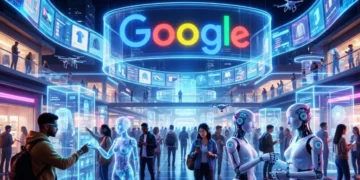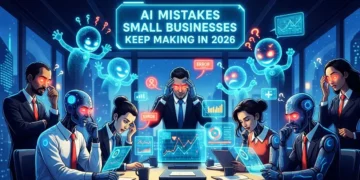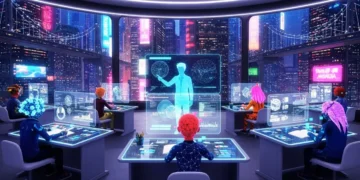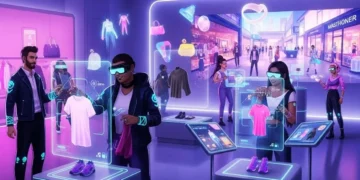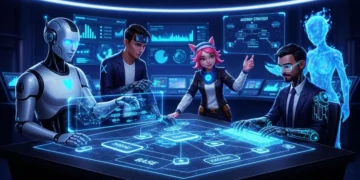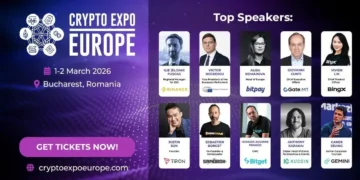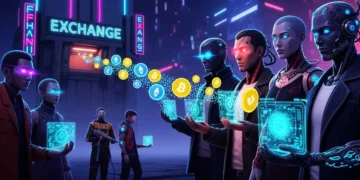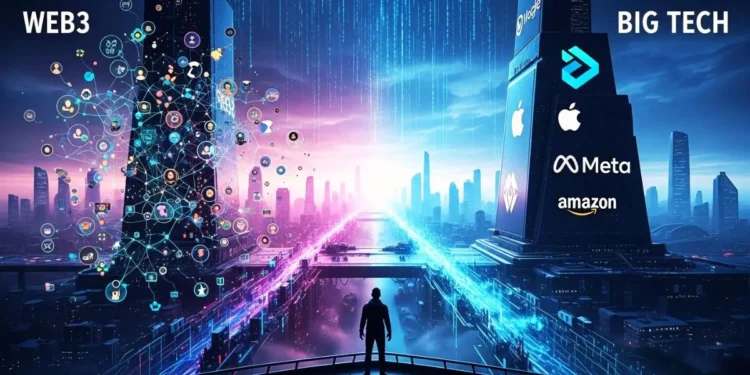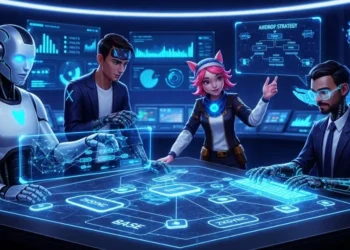It’s a battle of the digital age, quite literally – Big Tech, the trillion-dollar giants that have developed their empires at your expense by using your data, are on one side. On the other, a rising movement called Web3, which by its very nature is supposed to give back the power to the people, on the other side. The matter at hand is not only a technological one: the big question is who will eventually own the Internet? Will it stay as it is with only a few centralized corporations, or will the users through blockchain technology be the ones to hold the power?
Just to give you an idea: Google handles over 8.5 billion searches on a daily basis, while Facebook makes more than 97% of its revenue from ads whose primary source is user data. These companies have constructed a data monopoly that is the main part of today’s internet, usually referred to as Web2, on which the whole world is based. But what if you could be the owner of your digital identity, get benefits for your data, and have a say in the decision-making process? This is the future of the internet—one that is decentralized, as Web3 goes—and the battle for dominance has already begun.
Have you ever thought about why you are not allowed to transfer your social media reputation that you have worked so hard for from one platform to another? Or why you are not given a share of the enormous profits that are made from your online activities? These are the very issues that Web3 technology is designed to resolve. In this article, we will define the basic tenets of Web3, analyze the obstacles it has, and elucidate the importance of this digital revolution to you. Let’s dive in.
What is Web3? Understanding the Fundamental Shift
The confrontation is beyond understanding if one does not know what Web3 means in the first place. Essentially, Web3 stands for a new paradigm of the internet which is based on blockchain tech and its users have the democratic power to share it instead of being controlled by the central ones. The concept was first laid out in 2014 by the co-founder of the Ethereum, Gavin Wood, who came up with an idea to solve what he saw as the web’s excessive reliance on trust in private companies.
To appreciate what makes Web3 different, let’s briefly look at how the internet has evolved:
Web1 (1990-2004): The “read-only” web consisted mainly of static websites where users passively consumed information with minimal interaction .
Web2 (2004-present): The “read-write” web emerged with social media platforms, enabling user-generated content but concentrating power and value in a handful of tech companies .
Web3 (emerging): The “read-write-own” web uses blockchains, cryptocurrencies, and NFTs to return power and ownership to users .
Core Principles of Web3 Technology
What fundamentally distinguishes Web3 from previous iterations of the internet? Several key principles form its foundation:
Decentralization: Instead of large swathes of the internet controlled by centralized entities, ownership gets distributed amongst its builders and users . This means no single party has control over the network.
Permissionless Access: Everyone has equal access to participate in Web3, and no one gets excluded . Unlike today’s platforms that can de-platform users, Web3 aims to be accessible to all.
Trustless Operation: Web3 operates using incentives and economic mechanisms instead of relying on trusted third-parties . Through cryptography and smart contracts, transactions can occur directly between parties.
Native Payments: Web3 uses cryptocurrency for spending and sending money online instead of relying on the outdated infrastructure of banks and payment processors .
Table: Comparing Web1, Web2, and Web3 Characteristics
| Attribute | Web1 | Web2 | Web3 |
|---|---|---|---|
| Control | Decentralized | Centralized | Decentralized |
| User Role | Consumer | Product | Owner |
| Content Type | Static | User-Generated | User-Owned |
| Payments | None | Traditional Finance | Cryptocurrency |
| Identity | None | Platform Accounts | Self-Sovereign |
| Trust Model | None | Intermediaries | Code & Cryptography |
When you think about your current online experience, how much control do you really have over your digital life? This is the fundamental question Web3 seeks to address.
The Current Landscape: Big Tech’s Data Monopoly
If we want to know the reasons why Web3 is such a radical shift, the next thing to look at is the power of Big Tech in our present digital ecosystem. The expression “Big Tech” is generally used for the most significant data handlers such as Google, Meta (Facebook), Amazon, and the like, which over the years have transformed the personal data business into a trillion-dollar industry.
How Big Tech Maintains Control
Users in the Web2 scenario give up their privacy in exchange for comfort. Data-hungry platforms like social media, search engines, and e-commerce collect a variety of data, which they use for targeted ads, personalized user experiences, and profit maximization. These corporations run on a centralized model that entails saving user data on their servers, which, in turn, are a target for hackers, breaches, or even misuse by the corporation.
The numbers tell a compelling story:
Facebook (Meta) generates over 97% of its revenue from ad sales fueled by user data .
Google processes over 8.5 billion searches per day, tracking every move to refine its ad ecosystem .
Amazon uses purchase history and behavioral tracking to dominate the e-commerce space .
Such centralized control is at the core of what many critics refer to as a data monopoly – a situation where these few companies hold most of the user data and have the power to decide how the data should be used. Trying to transfer your Facebook friends to another platform or to export your YouTube watch history? These constraints are indeed intentional, as they generate what economists refer to as “switching costs” which make users stay in particular ecosystems.
The Advertising-Driven Revenue Model
The core business model of Web2 is based on the extraction of attention. According to McKinsey, Web2 companies “monetized user activity and data by selling them to advertisers, while retaining control over proprietary decisions about functionality and governance”. Therefore, users are turned into the product rather than the customers.”
This leads to an inherent mismatch between the incentives of the platforms and the interests of the users. Platforms, when they strive for engagement at any cost, tend to choose in most cases controversial, extreme or addictive content. The recent whistleblower revelations from social media companies have, in effect, been confirming over and over again these problematic incentives.
How Web3 Challenges the Status Quo
If we start from the understanding of the current centralized world, it will be easier to see how Web3 radically changes that. In fact, Web3 is not just a technology with a few features that can improve the current system, it is a fundamental re-architecting of the digital power structures and the incentives behind them.
Ownership and Control of Digital Assets
Web3 allows you to have ownership of your digital assets in a way that has never been possible before. Consider the following example: in a traditional Web2 game, if you buy an in-game item, it is directly linked to your account. If the game creators delete your account, you lose these items. Or if you stop playing, you lose the value that you had invested.
On the other hand, Web3 enables real ownership through non-fungible tokens (NFTs). Nobody, not even the game’s creators, can take away your ownership. If you discontinue playing, you can sell or trade your in-game items to open markets and get back their value. This is a major change in the way we think about temporary access versus real digital ownership.
Censorship Resistance and Platform Power
The power relation between platforms and content creators is largely on the side of the platforms in Web2. The case of OnlyFans is a perfect example of this—when the platform announced a plan to ban sexually explicit content in 2021, creators who had made their livelihoods on the platform were the ones that suffered the most. Though the decision was eventually reversed, it served as a warning of the precariousness of Web2 creators.
In Web3, your data is stored on the blockchain. When you decide to quit a platform, you can carry your reputation with you and connect it to another interface which is more in line with your values. This ability to move one’s identity and reputation from one platform to another completely changes the power structure between platforms and users.
Decentralized Autonomous Organizations (DAOs)
One of the most radical innovations of Web3 might be the idea of Decentralized Autonomous Organizations (DAOs). In addition to owning your data in Web3, you can collectively own the platform by using tokens that behave like shares in a company.
DAOs allow you to have decentralized ownership of a platform and decide its future. In fact, DAOs are “smart contracts that have been agreed upon and automate decentralized decision-making over a pool of resources (tokens)”. This is a new form of digital governance where users have a direct say in the platform’s change.
Key Battlegrounds in the Web3 vs Big Tech Conflict
DAOs allow you to have decentralized ownership of a platform and decide its future. In fact, DAOs are “smart contracts that have been agreed upon and automate decentralized decision-making over a pool of resources (tokens)”. This is a new form of digital governance where users have a direct say in the platform’s change.
Data Ownership and Monetization
The most fundamental conflict revolves around who owns and benefits from data. In the Big Tech model, users generate data but platforms capture most of the value. Web3 flips this model through approaches like:
Decentralized Identity (DID): Users control their digital identity with cryptographic keys, eliminating the need for third-party authentication .
Self-Sovereign Data: Instead of handing over personal information to corporations, Web3 allows users to monetize their data or keep it private .
The Brave Browser Example: This browser rewards users with Basic Attention Tokens (BAT) for viewing ads, shifting the power dynamic from advertisers to consumers .
Digital Identity and Authentication
In the modern internet, you probably have different accounts for each platform you use – Twitter, YouTube, Reddit – and each of them asks for passwords and personal information. Web3 fixes this problem by letting you manage your digital identity with an Ethereum address and a profile, thus giving “a single login across platforms that is secure, censorship-resistant, and anonymous”.
The way of identity here by means of which one has control over the platform-recorded identity systems, which the Big Tech are using for keeping users in their ecosystems, is a radical change.
Payments and Financial Infrastructure
The payment system of Web2 is dependent on banks and payment processors, which means that people who do not have bank accounts or those who live in a certain country that is not supported are excluded. Web3, on the other hand, utilizes tokens such as ETH to transfer money directly through the browser without the need for trusted third parties.
It is not merely a matter of money— the entire concept of financial infrastructure is being reconstructed from scratch, in a manner that is open, global, and accessible to anyone.
AI and Compute Infrastructure
An emerging battleground is artificial intelligence infrastructure. Big Tech is flooding AI with money, chips, and cloud muscle—spending $180 billion in 2024 alone . But Web3 startups are responding with decentralized approaches:
Distributed compute platforms like Aethir
Verifiable storage solutions like Filecoin and Arweave
AI agents with on-chain memory
As one expert noted: “Our real competition isn’t each other, it’s AWS” . The question is whether decentralized infrastructure can compete with the scale of Big Tech clouds.
The Challenges: Why Web3 Hasn’t Gone Mainstream Yet
If Web3 offers such compelling advantages, why hasn’t it already displaced Big Tech? The reality is that significant hurdles remain. Understanding these challenges is crucial to assessing Web3‘s future trajectory.
Technical and Scalability Limitations
Despite progress, Web3 still faces technical limitations:
Accessibility: The relative cost of transactions remains prohibitive to many. Web3 is less likely to be utilized in less-wealthy, developing nations due to high transaction fees .
Scalability: Blockchain networks can become very expensive and computationally demanding as data volumes increase .
Centralized Infrastructure: The Web3 ecosystem currently depends mainly on centralized infrastructure (GitHub, Twitter, Discord, etc.) .
User Experience and Complexity
At the moment, the technical hurdle of getting into Web3 is so significant that it is almost impossible for a common person to use it. The users have to figure out various security issues, going through complicated technical documents, and even when the user interfaces are available, they have to be intimidating and non-friendly for the users. One of the critics didn’t mince his words when he said, “Web2 apps? Click, login, done. Web3 apps? Download a wallet, buy crypto, sign transactions, pray gas fees don’t kill you”.
Mainstream adoption will still be hard to achieve until web3 applications can provide equal or better user experience than web2 alternatives.
Regulatory Uncertainty
Governments worldwide are still determining their approaches to governing issues such as:
Consumer and investor protection
Legality and enforceability of blockchain-based contracts
Know-your-customer and anti-money-laundering standards
This regulatory uncertainty creates headwinds for Web3 development and adoption.
Environmental Concerns
Critics have raised concerns about the environmental impact of cryptocurrencies and NFTs . While solutions like proof-of-stake aim to be less energy intensive, environmental considerations remain a legitimate challenge for some Web3 technologies.
Is Web3 Dead? Examining the Current State
Given these challenges, many are asking: Is Web3 dead? The hype cycle has certainly cooled since the peak of 2021, but the reality is more nuanced than simple obituaries suggest.
Beyond the Hype Cycle
The technology adoption lifecycle suggests that after the “peak of inflated expectations” comes the “trough of disillusionment,” followed by the “slope of enlightenment.” Web3 appears to be moving through this natural progression.
As one commentator noted: “Web3 isn’t dead—it’s just having an identity crisis. The next big leap will come when someone actually builds a Web3 product that’s BETTER than its Web2 alternative” .
Continued Development and Investment
Despite market fluctuations, development continues:
The sales count for NFTs increased 68 percent in 2022, despite a slowdown in the second half of the year .
Core tool downloads for Ethereum increased by 87 percent in 2022 .
Global tokenization market grew by about 23 percent .
Major companies including Nike, JPMorgan Chase, and others continue to experiment with Web3 technologies .
The Evolving Narrative
The conversation has shifted from pure speculation to practical infrastructure and applications. Rather than asking “Is Web3 dead?”, the more relevant question might be: “Which aspects of Web3 will deliver lasting value beyond the hype?”
The Role of Web3 Jobs in Ecosystem Growth
A key indicator of Web3‘s health is the job market. Despite market volatility, demand for Web3 jobs remains robust, suggesting continued investment in ecosystem development.
Current Web3 Job Landscape
According to specialized job platforms, there are thousands of open positions in the Web3 space, ranging from engineering and product roles to marketing, legal, and community management . These positions span everything from decentralized finance protocols to infrastructure companies and consumer applications.
Salaries for Web3 jobs remain competitive with traditional tech roles, with senior engineering positions often offering $150,000-$250,000 or more .
Skills for Web3 Careers
The most sought-after skills for Web3 jobs include:
Blockchain development (Solidity, Rust)
Smart contract auditing
Token economics design
Community management
Cryptography and security
This diverse skill set requirement indicates the maturation of Web3 from a niche interest to a multifaceted industry.
AI and Web3: Competitors or Collaborators?
As the hype around Web3 was met with the explosion of generative AI, many wondered: Will AI replace Web3? The answer is no. Rather than being competitors, AI and Web3 are powerful complementary technologies.
AI can make Web3 smarter and more efficient. For example, AI can help automate the creation and auditing of smart contracts, detect fraud on blockchains, and create more intuitive user interfaces for dApps.
Web3 can make AI more trustworthy and transparent. By recording AI models and their data on a blockchain, we can create a verifiable and auditable trail, addressing concerns about AI bias and “black box” algorithms. Web3 can also facilitate decentralized marketplaces for AI services.
Projects like Fetch.ai and SingularityNET are already exploring this powerful synergy. The future is likely one where AI-powered intelligence operates on a decentralized, trustless foundation provided by Web3.
The Future Outlook: Pathways to Mainstream Adoption
Looking forward, several potential pathways could lead to Web3 achieving broader adoption and potentially challenging Big Tech dominance.
The AI Integration Opportunity
Some experts believe that Web3‘s transparency advantages could become particularly valuable in the age of AI. With deepfakes and hallucinations rampant, data integrity is gold. In Web2, you trust the provider; in Web3, you verify the source .
The combination of verifiable data with specialized AI agents could create compelling use cases that don’t rely on beating Big Tech at scale but instead offer qualitatively different value propositions.
The Telegram Model
Some see messaging platform Telegram as a potential on-ramp for mainstream Web3 adoption. With its 900 million users and integration with The Open Network (TON) blockchain, Telegram represents a novel hybrid approach .
Telegram Mini-Apps are “an open platform for new and emerging brands to deploy crypto-friendly games and apps” . This approach combines Web2 convenience with Web3 capabilities, potentially offering the best of both worlds.
Infrastructure Maturation
As layer 2 scaling solutions mature and user experience improves, many of the current barriers to Web3 adoption may naturally diminish. Zero-knowledge proofs, account abstraction, and other technical innovations could make Web3 applications nearly as seamless as their Web2 counterparts.
The Verdict: A Decentralized Future Forged in Competition
So, who will own the future internet? The answer is nuanced. Big Tech isn’t going anywhere overnight. They have the resources, user base, and political influence to remain dominant for the foreseeable future.
However, Web3 represents a powerful ideological and technological shift that cannot be ignored. It’s a movement to reclaim digital ownership, and it’s gaining momentum. The most likely outcome is not a complete overthrow but a hybrid future where centralized and decentralized systems coexist and compete. Big Tech will likely incorporate elements of Web3 to stay relevant, while new decentralized challengers continue to innovate and capture market share.
The battle is on. The question for you is: will you be a passive observer, or will you take part in building the future?
Ready to dive deeper? Share your thoughts in the comments below or explore career opportunities to make your mark on the next generation of the internet. For more insights on digital strategy, check out our [internal link to relevant page].
Conclusion
The battle between Web3 and Big Tech for the future of the internet is far from decided. Big Tech possesses overwhelming advantages in resources, user bases, and infrastructure. Yet Web3 offers a fundamentally different vision—one that aligns better with the internet’s original decentralized ethos.
The most likely outcome isn’t total victory for either side but rather a blended future where elements of both paradigms coexist. We may see Big Tech companies gradually incorporating Web3 elements while Web3 projects adopt more user-friendly approaches reminiscent of Web2.
What seems certain is that the internet will continue evolving. The centralized model of Web2 has revealed significant limitations and vulnerabilities. Whether Web3 provides the complete answer or merely inspires incremental improvements, its emergence has already shifted the conversation toward user ownership and control.
The real winners will be those who build systems that balance efficiency with equity, innovation with responsibility, and profit with shared value. The future internet may not be purely decentralized nor entirely centralized—but hopefully, it will be more balanced, fair, and user-centric than what we have today.
The question isn’t just “Who will own the future internet?” but rather “What kind of internet do we want to build together?” The answer will shape our digital lives for decades to come.
Frequently Asked Questions
Is Web3 the future of the internet?
Web3 represents one possible future for the internet—one that emphasizes decentralization and user ownership. While it’s too early to say definitively whether it will completely replace today’s web, elements of Web3 are already influencing internet evolution. Major companies and developers continue to build Web3 infrastructure, suggesting it will play some role in the internet’s future .
Why is Web3 not the future?
Some critics argue Web3 faces fundamental challenges including scalability issues, poor user experience, regulatory uncertainty, and the continued dominance of Big Tech platforms. Billionaires like Elon Musk and Jack Dorsey have expressed skepticism, with Dorsey arguing that Web3 merely serves as a buzzword or marketing term .
Will AI replace Web3?
AI and Web3 are complementary rather than competitive technologies. In fact, many projects are exploring how to combine AI with Web3 infrastructure to create more transparent and verifiable AI systems. Some experts believe Web3’s approach to data integrity could be particularly valuable in an age of AI-generated content and hallucinations .
Who is the owner of Web3?
By design, no single entity owns Web3. The core principle of Web3 is decentralized ownership, distributed among its builders and users . However, critics like Jack Dorsey have argued that in practice, venture capital firms and early investors may end up with significant control .
Why did Web 3.0 fail?
It’s premature to declare Web3 a failure. While it hasn’t yet achieved its most ambitious goals, development continues across multiple sectors including decentralized finance, identity systems, and infrastructure. The technology adoption lifecycle typically includes periods of disillusionment before technologies find their sustainable use cases .
What does Elon Musk think of Web3?
Elon Musk has expressed skepticism about Web3, tweeting in 2021 that it “seems more marketing buzzword than reality right now” . His perspective aligns with other critics who believe the current implementation doesn’t yet live up to the revolutionary promises of its advocates.
